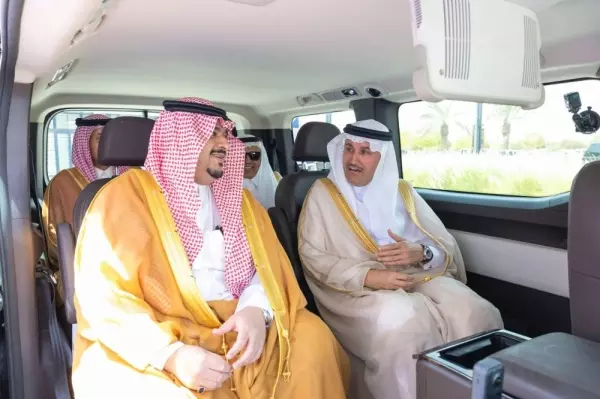
Riyadh Deputy Emir tests self-driving car, inspects airport projects
text_fieldsRiyadh’s Deputy Emir Prince Mohammed bin Abdulrahman rode a self-driving vehicle to King Khalid International Airport. He was joined by Transport Minister Saleh Al-Jasser and reviewed major development projects.
The journey began at Roshn Front and ended at the airport terminals. It was a practical demonstration of the Kingdom’s first rollout of self-driving vehicle services in parts of the capital.
Airport Expansion and Smart Systems
At the airport, Prince Mohammed inspected the operations control center, where Minister Al-Jasser stressed its central role in improving efficiency. He explained that the center uses advanced operating systems and artificial intelligence “to ensure smooth passenger flows and enhance traveler experiences through advanced operating systems and artificial intelligence".
The Deputy Emir also visited International Terminal 2 and Terminal 1 to observe ongoing expansion works. His tour included a full review of the passenger journey from departure to arrival.
Senior officials welcomed him at the airport, including Abdulaziz Al-Duailej, President of the General Authority of Civil Aviation; Dr. Ghazi Al-Rawi, Chairman of Riyadh Airports Company; Raed Al-Idrisi, CEO of Matarat Holding and Ayman Abu Abah, CEO of Riyadh Airports Company.
Boosting Passenger Capacity
Al-Jasser emphasized the impact of the airport upgrades, saying, “the development of Terminals 1 and 2 will add capacity for 14 million passengers annually. Combined with other projects, King Khalid International Airport’s total capacity will rise to about 56 million passengers per year",
He added that these expansions are part of a broader plan to strengthen Riyadh as a key transport and logistics hub.
“These infrastructure investments will reinforce Riyadh’s role as a global logistics hub, expand the economic footprint of cargo and logistics operations, and strengthen the capital’s position as an international center for travel, transport, tourism and trade", Al-Jasser said.
The minister also linked the current works to the future King Salman International Airport, describing it as one of the most ambitious aviation projects globally.
“The expansion projects serve as a precursor to the King Salman International Airport project, expected to become the largest in the world by 2030 with an initial capacity exceeding 100 million passengers annually, growing to 185 million by 2050".












